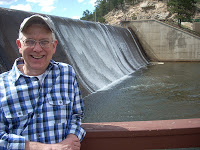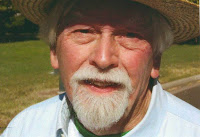names, others for their engaging communications, still others for the lack of
impact they made on me. From grade school I recall Miss Weenes whom we second
graders called Miss Weenie, although not in class, and Mrs. Schaffer who read
“Treasure Island” to us, my first novel; there were others whose names escape
me, but I do recall the woman who taught us cursive writing in fifth grade leaving
me with a rather readable hand and the rather effeminate man who taught music
in fourth and fifth grades introducing us to Bizet’s “Carmen.” From junior high
I recall Mr. Moon who at the board always pointed with his middle finger and
who told memorable stories about science, Miss Oliver who taught Latin not only
to me but to my older sisters and to my mother, the effective algebra teacher who
also taught my mom and started geraniums in the windows of her classroom, and
Miss Costello who sent home a mustard plaster recipe when too many students got
colds. From high school I remember Mr. Martin the choir director, Mr. Snodgrass
the band director, Miss Perkins the Latin teacher and drama coach, and Mr. Unruh
the football coach and government teacher. In college, I remember Dr. Van Buren,
President Lown, Mr. Secrest, and Professor Jamie Morgan; in graduate school,
Mrs. Kiesgen and Dr. Lee; in seminary Dr. Duke, Dr. Routt, Dr. Hoehn, and Dr.
Rowell. But that’s only the beginning of the list. I also had music teachers in
piano and voice studios, art teachers at the Oklahoma Art Workshops, leaders of
numerous seminars and workshops at hotels and conference centers, and informal
mentors whose revelations and advice paved the way for a rich life of learning,
work, and enjoyment. Trying to list all my teachers indicates I learned many
things from many different instructors over a long life. I owe a lot to these
people.
well knew they had feet of clay. She supported them through her tireless work
in the PTA but also challenged them when their behavior overstepped their role
of teacher and nurturer of young people. So when I heard harangues from the
pulpit that some faithless people scandalously thought of Jesus as only a
teacher, I felt unsettled. Mom taught us that being a teacher was one of the
very best occupations anyone could pursue. Of course, those preachers were
defending the orthodox doctrine of the divinity of Christ. I was not concerned with
orthodoxy and thought if Jesus back then or as a spiritual presence could teach
anyone, he could be my teacher as well and earn my deepest respect. Like Mom, I
liked my teachers. Two, though, stand out as the most influential: the first
for inspiration, the second for technique.
to school and took his demanding class, “Survey of Biblical Literature.” After
that there were other classes in biblical studies, philosophy, theology, sociology,
and literature. Studying in a small college, I got to make a rather thorough
study of this professor who was both the hardest one to get good grades from
and the one who opened worlds of knowledge most widely. I can say confidently
that Dr. Van taught me how to run successfully on the liberal edge of
conservatism. By ‘successfully’ I mean not only getting beyond political
hurdles but also doing so while maintaining theological self-respect and
integrity. He taught me to read broadly, to think openly, and to communicate
creatively. For instance, he lectured on Christian humanism, Christian
hedonism, Christian stoicism, and Christian Epicureanism insisting that
Christian thought was not a complete philosophy in itself but a base from which
one examined and utilized perspectives of the ages. He taught humor as an
essential ingredient in the most serious communications and sex as a broadly
celebrative dynamic of life. In Dr. Van’s approach God as the creator and
approver of creation served as the starting point and essential part of a
healthy approach to life, morality, and ethics. He insisted that creative and
playful thinking stands as a necessary component in one’s life and insisted
religion should never become a wooden legal transaction or set of rigid laws.
He taught an appreciation for beauty through arts, literature, science, and everyday
interactions with fancy and plain people. Poetry, storytelling, drama, and
lively insights transformed theology into a process for living. The arts
pointed to dynamic creativity in the name of the Creator.
stomach as if it were a lectern. This enthusiastic professor lectured from the
book of Job on the dances of whales in the ocean, leaping about like one of
them himself. This insightful professor opened the way to Shakespeare, Milton, and
Whitman. This scholarly professor had been granted a DD and then earned a PhD
in English Literature, his dissertation an examination of Old Testament Apocryphal
references in John Milton’s poetry. This superlative teacher supported in me my
love for books and libraries and my proclivity toward creative thinking in
matters of education and religion. I continue to think about Dr. Van Buren’s
advice, knowledge, and approach whenever I try to solve problems or speak from
my own heart.
doctoral degree in piano pedagogy. She served as the church’s music coordinator
and organist where I worked as associate minister and director of the Chancel
Choir. We made music together for several years before I studied in her piano
studio. I recall this teacher for both her pianistic and pedagogical techniques—carried
out with consistency, musical depth, and always the encouragement to keep
making beautiful music. I’ll never know if I could have learned piano technique
at an earlier age, but I did learn it in my late thirties under her tutelage.
When I approached my 40s crisis (a la Goldberg and Sheehe), I became
“angry with the gods of literature” as my friend Gerald put it and went on a yearlong
book fast. I joined Karen’s studio to learn to play piano, knowing I’d have
about three hours a day to practice, time I would not be reading books. I
remained a student in her studio for two and a half years. Since childhood I had
played—my father said banged—the piano but always with great limitation. Gerald
once said I was quite musical but had no technique. After two years of Karen’s
discipline I played a piece for my dad. He declared, “She’s a miracle worker;
you’re not pounding.” Even Gerald seemed impressed at her work and my response,
and Dr. Bartman said what she appreciated about teaching me—an adult—was that I
always played musically.
perfect posture and insisted I do so as well. This enthusiastic teacher with
beautifully strong hands didn’t just give me scales and arpeggios to strengthen
my hands but showed me how to execute them in ways that engaged listening,
phrasing, and trusting that my hands would know where they were on the
keyboard. This insightful teacher showed me how to ground myself at any point
in a phrase, a measure, or a beat giving life to the composition in
performance. This scholarly teacher helped me know Bach, Mozart, Brahms,
Schubert, Schumann, Chopin, Debussy, Mompou, Shostakovich, and Prokofiev in
ways I had never grasped even after extensive graduate study in musical style
analysis. This superlative teacher inspired me to practice with confidence that
I could play effectively and beautifully. Eventually I quit piano instruction
and returned to books and writing. Still, I continued to practice and put to
use my grasp of her technique when I played. From her I learned the value of
technical proficiency. Her consistent teaching encouraged me to continue to
develop as an artist and to bring artistry to bear in all my work.
arts, Dr. Bartman encouraged me to find consistent techniques for any creative
work I undertook. My life as a learner continues inspired and enabled by these
two great teachers. There have been plenty more teachers, loads of learning,
and lots of creative outcomes that today I celebrate along with this litany of my
teachers’ names.
lives in Denver and spends his time writing, painting, and socializing. In
general he keeps busy with groups of writers and artists. Following thirty-two
years in church work and fifteen in a therapeutic massage practice, he now
focuses on creating beauty. He volunteers at The Center leading the SAGE
program “Telling Your Story.”


